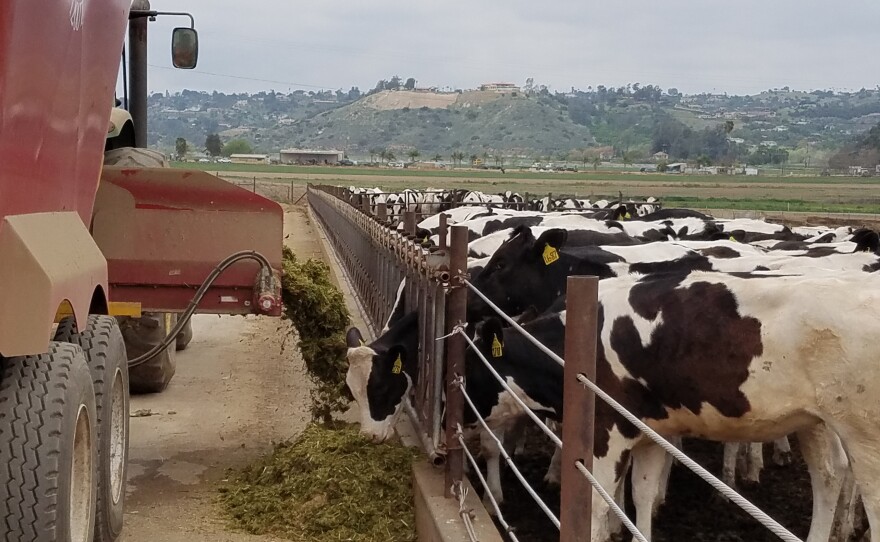The beer brewing process kicks off at around 5 a.m. at Mike Hess Brewing in North Park. They are creating Hess' craft beers, from an IPA to a darker stout or porter.
But brewing also produces waste — and a lot of it.
The waste is called spent grain, and founder Mike Hess said they make about 20,000 pounds a week.
When Hess first started brewing a decade ago, his batches were so small that he could give a few buckets of grain to a friend who would feed it to her chickens. But as his operation grew and he moved into the North Park brewery, he needed something bigger.
"It became more and more tedious to get rid of the grain," he said. "When we got here, we knew we'd need to come up with a different solution."

That solution involved a different industry that you would think has nothing in common with craft beer: farming. But there is actually a symbiotic relationship between the two, where farm animals eat the grain produced during the brewing process.
Now, with almost 150 breweries in the county and a declining number of farms, it is becoming more challenging for new breweries to find someone to take their grain.
"Certainly finding an elegant solution to where to put the grain is the holy grail," Hess said. "If you're brewing, you've got waste every time you brew in the form of a large wet mass."
He could just throw it away, but that would be a lot of waste to get rid of every week. And besides, not everyone thinks it is waste.

At Frank Konyn Dairy near Escondido, spent grain is a regular part of the diet for the nearly 800 cows.
"We're part of a dying breed, there's not a whole lot of dairies or animal agriculture left in San Diego County," Konyn said.
Konyn grew up on the farm and took it over from his father. He collects grain from 13 local breweries.
"So that's one of the ways that we've worked to help mitigate rising feed costs and make ourselves a little more economical, but also to be socially responsible, to be part of the community and part of the solution of recycling," he said.
Almost every day, Konyn's trucks head out to pick up the grain bins from the breweries. They bring it back to the farm, where a staff nutritionist mixes it in precise proportions with other grains, plus leftover bread from local bakeries, fruit pulp from local juice companies, and alfalfa.
The brewery grain is high in protein, which helps the cows make more milk, Konyn said.
"I often view my cows, they're kind of Olympic athletes," he said. "I am asking them to optimize their performance and the only way they're going to optimize their performance is if I'm giving them the best diet possible."
But Konyn only likes to pick up grain from bigger breweries — they have to make enough grain for it to be worth a trip.
That does not include Alta Brewing, which just opened last year and only produces about 1,500 pounds of spent grain a month. Owner Brett Stampf recently found a small farm to take his grain.
Without that, "I have to take a trip up to Miramar and of course pay for it," he said. "The farmer comes and picks it up and I just give it to him."
Now that there are so many more breweries than farms in San Diego County, finding someone to take spent grain can be a challenge for beer brewers just getting started. But Stampf said it is important to make the grain into something usable.
"It helps a guy out," he said, referring to the farmer. "It goes to something that I understand has a meaning."
Back at the dairy farm, Konyn said the spent grain does help him out by decreasing costs. But he also said he is helping out breweries, too, by recycling their waste.
"You're merging an urban center with animal agriculture and now there's a need for both to coexist," he said.
As far as he can tell, the cows do not have a preference of IPAs to stouts.







